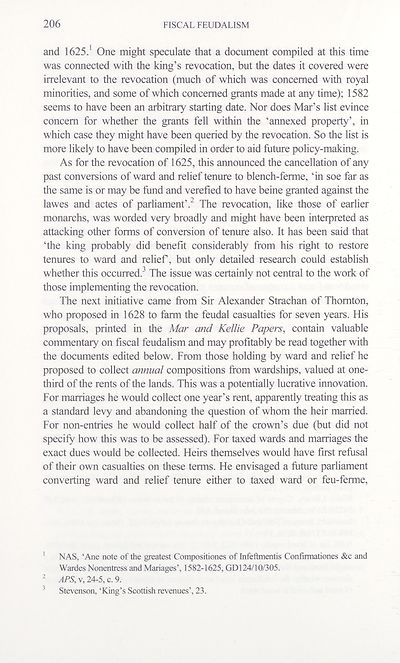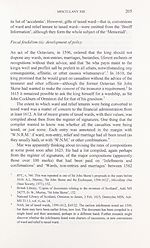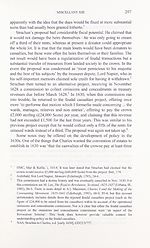Series 5 > Miscellany [of the Scottish History Society] XIII
(221) Page 206
Download files
Complete book:
Individual page:
Thumbnail gallery: Grid view | List view

206
FISCAL FEUDALISM
and 1625.1 One might speculate that a document compiled at this time
was connected with the king’s revocation, but the dates it covered were
irrelevant to the revocation (much of which was concerned with royal
minorities, and some of which concerned grants made at any time); 1582
seems to have been an arbitrary starting date. Nor does Mar’s list evince
concern for whether the grants fell within the ‘annexed property’, in
which case they might have been queried by the revocation. So the list is
more likely to have been compiled in order to aid future policy-making.
As for the revocation of 1625, this announced the cancellation of any
past conversions of ward and relief tenure to blench-ferme, ‘in soe far as
the same is or may be fund and verefied to have beine granted against the
lawes and actes of parliament’.2 The revocation, like those of earlier
monarchs, was worded very broadly and might have been interpreted as
attacking other forms of conversion of tenure also. It has been said that
‘the king probably did benefit considerably from his right to restore
tenures to ward and relief, but only detailed research could establish
whether this occurred.3 The issue was certainly not central to the work of
those implementing the revocation.
The next initiative came from Sir Alexander Strachan of Thornton,
who proposed in 1628 to farm the feudal casualties for seven years. His
proposals, printed in the Mar and Kellie Papers, contain valuable
commentary on fiscal feudalism and may profitably be read together with
the documents edited below. From those holding by ward and relief he
proposed to collect annual compositions from wardships, valued at one-
third of the rents of the lands. This was a potentially lucrative innovation.
For marriages he would collect one year’s rent, apparently treating this as
a standard levy and abandoning the question of whom the heir married.
For non-entries he would collect half of the crown’s due (but did not
specify how this was to be assessed). For taxed wards and marriages the
exact dues would be collected. Heirs themselves would have first refusal
of their own casualties on these terms. He envisaged a future parliament
converting ward and relief tenure either to taxed ward or feu-ferme,
' NAS, ‘Ane note of the greatest Compositiones of Infeftmentis Confiimationes &c and
Wardes Nonentress and Manages’, 1582-1625, GDI24/10/305.
2 APS, v, 24-5, c. 9.
3 Stevenson, ‘King’s Scottish revenues’, 23.
FISCAL FEUDALISM
and 1625.1 One might speculate that a document compiled at this time
was connected with the king’s revocation, but the dates it covered were
irrelevant to the revocation (much of which was concerned with royal
minorities, and some of which concerned grants made at any time); 1582
seems to have been an arbitrary starting date. Nor does Mar’s list evince
concern for whether the grants fell within the ‘annexed property’, in
which case they might have been queried by the revocation. So the list is
more likely to have been compiled in order to aid future policy-making.
As for the revocation of 1625, this announced the cancellation of any
past conversions of ward and relief tenure to blench-ferme, ‘in soe far as
the same is or may be fund and verefied to have beine granted against the
lawes and actes of parliament’.2 The revocation, like those of earlier
monarchs, was worded very broadly and might have been interpreted as
attacking other forms of conversion of tenure also. It has been said that
‘the king probably did benefit considerably from his right to restore
tenures to ward and relief, but only detailed research could establish
whether this occurred.3 The issue was certainly not central to the work of
those implementing the revocation.
The next initiative came from Sir Alexander Strachan of Thornton,
who proposed in 1628 to farm the feudal casualties for seven years. His
proposals, printed in the Mar and Kellie Papers, contain valuable
commentary on fiscal feudalism and may profitably be read together with
the documents edited below. From those holding by ward and relief he
proposed to collect annual compositions from wardships, valued at one-
third of the rents of the lands. This was a potentially lucrative innovation.
For marriages he would collect one year’s rent, apparently treating this as
a standard levy and abandoning the question of whom the heir married.
For non-entries he would collect half of the crown’s due (but did not
specify how this was to be assessed). For taxed wards and marriages the
exact dues would be collected. Heirs themselves would have first refusal
of their own casualties on these terms. He envisaged a future parliament
converting ward and relief tenure either to taxed ward or feu-ferme,
' NAS, ‘Ane note of the greatest Compositiones of Infeftmentis Confiimationes &c and
Wardes Nonentress and Manages’, 1582-1625, GDI24/10/305.
2 APS, v, 24-5, c. 9.
3 Stevenson, ‘King’s Scottish revenues’, 23.
Set display mode to:
![]() Universal Viewer |
Universal Viewer | ![]() Mirador |
Large image | Transcription
Mirador |
Large image | Transcription
Images and transcriptions on this page, including medium image downloads, may be used under the Creative Commons Attribution 4.0 International Licence unless otherwise stated. ![]()
| Scottish History Society volumes > Series 5 > Miscellany [of the Scottish History Society] XIII > (221) Page 206 |
|---|
| Permanent URL | https://digital.nls.uk/127316181 |
|---|
| Description | Over 180 volumes, published by the Scottish History Society, containing original sources on Scotland's history and people. With a wide range of subjects, the books collectively cover all periods from the 12th to 20th centuries, and reflect changing trends in Scottish history. Sources are accompanied by scholarly interpretation, references and bibliographies. Volumes are usually published annually, and more digitised volumes will be added as they become available. |
|---|


